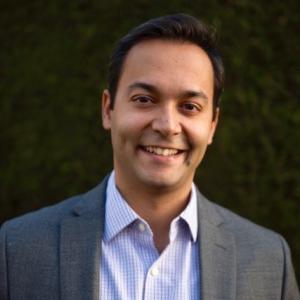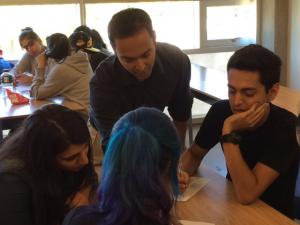Five questions for Rajiv Jhangiani
Rajiv Jhangiani, Ph.D., the 2018 Colorado Learning and Teaching with Technology (COLTT) conference keynote speaker, is an eminent Open Educational Resources (OER) researcher and advocate. He wants to correct a crucial misperception that makes top-tier research universities late to the table in embracing OER (with a few notable exceptions such as MIT’s Open Courseware initiative): Research universities must understand that “the Open Ed movement is about democratization of knowledge creation,” not just knowledge itself.
OER is much more than free digital textbooks. Jhangiani plans to show that OER makes unprecedented academic freedom and innovation possible in higher education.
Jhangiani also blogs and directs the Open Pedagogy Notebook, a shared-practices online community. He teaches psychology, conducts research in learning science with a focus on OER implementation, and serves as special adviser to the provost on open education at Kwantlen Polytechnic University in British Columbia.
His visit to COLTT – set for Aug. 1-2 at CU Boulder’s Wolf Law Building – is a well-timed boost to OER momentum already in progress at the University of Colorado. The free interactive science simulations offered by CU Boulder’s PhET program, founded in 2002 by Nobel Laureate Carl Wieman, are some of the world’s best-known and often-deployed OER. The CU system and all four campuses have begun ramping up robust exploratory OER initiatives since the Colorado Department of Higher Education established the Open Educational Resources Council in 2017.
Jhangiani’s COLTT keynote, “Serving Access, Equity and Innovation Through Open Educational Practices,” will explore the transformative possibilities of OER as well as some potential areas of concern that demand a careful, critical approach as CU and other research universities embark on major OER initiatives. His talk will draw from some of the guiding principles advanced in “Open: The Philosophy and Practices That are Revolutionizing Education and Science,” a freely available OER volume he edited with Robert Biswas-Diener.
1. What should people in higher education know about OER that they’re not yet grasping?
I think people assume Open Educational Resources are about free online textbooks — that’s the most common understanding of it, and it’s an idea that’s been perpetrated on purpose. I think if there’s one thing I would hope people in higher ed would grasp, it’s that in some sense the least significant benefit of Open Educational Resources is highly significant cost savings to students. It’s not just about equitable access to knowledge; it’s also about equitable access to knowledge creation.
2. How do your background and current work in psychology and learning science influence your perspective on Open Educational Resources?
Working in psychology and the scholarship of teaching and learning, I’m interested in understanding and measuring the impact that open education is having on students as well as educators in terms of both immediate and long-term consequences. What brings educators to open education? What do they take away? A lot of people I work with come to OER specifically for the cost savings, but they stay for the pedagogy. I’m interested in what it means in terms of the reinvigoration of one’s approach and commitment to higher ed.
3. What insights and perspectives do you want COLTT attendees to get out of your keynote?
I hope those who don’t know much about open education leave with a good understanding that it doesn’t just involve a focus on resources. I want to give them a broader sense of what the practices are.
In Colorado, there is so much momentum and support for this work, so I am also keen for people to leave with a clear sense of why and how “open” is not a panacea, how it is possible for us to perpetrate harm with the best of intentions within open education. So it is important as people come into this space that they adopt and maintain a critical perspective.
4. How do you see the role of Open Educational Resources in the current and future evolution of the higher education landscape?
We’re going to see a lot more of it. We already have a ton in the highest enrolled areas. Government-sponsored projects and OER projects sponsored by philanthropic organizations tend to focus on the higher enrollment courses. Universities are investing in the niche courses, especially when it surrounds a flagship program — a program that they’re known for. We’re going to see a lot more OER especially in these niche areas.
We’re also already seeing communities of practitioners growing around resources, the use of tools to build community. A very interesting growing heterogeneous community that up to this point has been heavier at the community college end is also rapidly growing now at R1 institutions.
Right now we’re seeing a lot of adoption and very little adaptation and creation. One of the exciting things about the community is that we’re seeing a lot more derivative works — a lot more adaptation. I’m seeing adaptations really ramp up over time.
5. What advice do you have for CU on how to leverage the promise and avoid the pitfalls of OER as we roll out new OER initiatives in this historical moment?
Context matters. Institutional history matters. It will tell you where the land mines are, where the opportunities are. Some people will always be suspicious of any new initiative, let alone open ed.
Libraries have been at the leading edge of the open ed movement. They are incredibly well-positioned to help with discoverability, with services to modify and adapt resources.
A lot of collaboration is necessary. Don’t leave collaboration to accident — deliberately look for those opportunities to make connections. For example, if the library has great expertise in the discoverability of OER, the teaching and learning center may already know which faculty are the really innovative pedagogues who may be most interested in open pedagogy.
Accessibility: When you’re building or creating OER, work closely with your office that serves students with disabilities. Use it as an opportunity to raise awareness and educate people on principles of universal design for learning.
Look for opportunities beyond collaboration within the institution. One of my favorite sayings is, “If you want to go fast, go alone. But if you want to go far, go together.” Foster collaborations; do this as a system. Connect faculty within the same discipline across institutions.
Support academic freedom, support choice. The last thing you want to do is mandate open initiatives — this is completely against the spirit of the movement.
I’d love to see the CU system follow the lead of places like the University of British Columbia, where the creation and adaptation of OER is now part of the criteria for promotion and tenure.
I think it’s incredibly important for universities to recognize the labor that goes into OER, and once they recognize it, enable that kind of labor by actually supporting it. Make sure we’re not reserving the privilege of making OER to the already privileged.
Geoffrey Rubinstein is director of online learning in the Division of Continuing Education and Professional Studies at CU Boulder. For a full-length version of the interview with Rajiv Jhangiani, see his page on the COLTT website.



